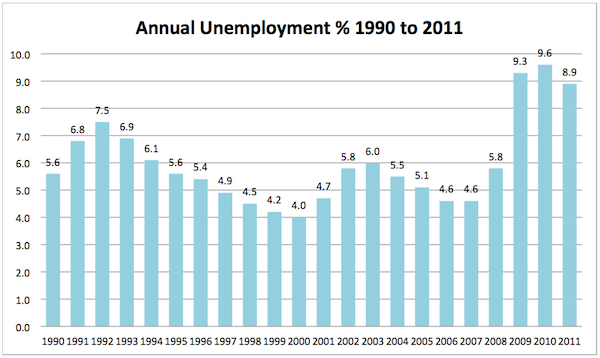
The era of the good job is mostly over. It may have been a 20th century thing. Don’t wait around for lots of good jobs to show up begging for applicants. Between outsourcing, the slow economy, automation, downsizing, offshoring, benefits reductions and corporate mergers, the job market aint what it used to be.
Even if you still have a good job or decent job, keep reading. The thing is that companies don’t do business like they used to. They minimize the number of permanent, full-time jobs they have and maximize the use of independent contractors engaged on a temporary, part-time basis. This is a rational adaptation to accommodate (1) our rapidly changing environment and (2) global competition.
You are a business of one — an independent contractor — who may currently have a full-time gig. If you would like to develop or expand your own knowledge-based career, read on. Here are 14 ways to use all that underemployment you are complaining about to better your situation in a big way.
I’m speaking to all you talented people who can do lots of good things and want to be working more and enjoying it more both personally and financially. A lot of people are out of work, got laid off, don’t have enough work in their own chosen business or profession since money is tight and the economy has taken a breather.
A lot of people are stunned and confused to not be getting the quantity of work they want. Maybe you are over forty and can’t seem to get the job you want competing against casts of thousands of other job applicants. Maybe you were getting enough work as an independent knowledge professional without extending yourself beyond your comfort zone when times were better. Whatever the reason, there’s work to do now to set the ship aright.
Nothing prevents you from creating value for yourself and others without an official job. We need a clear set of concepts about this because a ton of people are out of work and a lot won’t get their jobs back.
Jobless? That may not be the problem you think it is. What else is there to do? You don’t need an employer, necessarily. There are other options for making enough money without one. Here’s a list of 14 constructive ideas:
1. Train yourself by reading, doing exercises and creating branded web presence and your own information products or software. Read free blog posts. Lynda.com provides affordable online training in various content-creation applications. YouTube training videos are incredibly useful for a lot of short subjects you may need to learn to better compete in this environment. Apple’s own iTunes University is a new source of free education. Re-training and education has always been a smart choice during economic downturns.
When you train yourself, you use your time – the same time that gets sold to employers when you have a job. You create value for yourself in terms of increasing your marketable skills and knowledge. Your projects described here also increase your desirability, accessibility and visibility in the marketplace or actually create info products that can be sold.
2. Groups and Buddies. While you are doing #1, do a lot of it in tandem or in groups because that makes it more fun, provides a structure and builds valuable informal partnerships that broaden and deepen your social network which gives you more points of contact with the marketplace. Your teams and partners can trade services and products with you. Your own personal marketplace outside the jobs world we’ve been brainwashed to believe is the only way things can be done – everything else is viewed as not “real†and not of much value.
3. Off the Grid Can be Good. While you are in the informal cooperative economy, you are largely off the grid relative to the IRS and therefore will reduce your taxes. At the same time, if you both deduct expenditures on the other person’s services and those services can be described as for business, there’s no net tax consequence anyway.
4. Get out there and Start Trading. People may be reluctant to hire you, but they might be more than ready to trade their services for yours if you ask. On a trial basis, start doing something for trade where you get something back. That payback can be in the future a little bit. This is how most social networking works. We help each other back and forth over a period of time without major scorekeeping. If things get too far out of balance, we renegotiate the relationship by talking it over and finding a way to rebalance or if that doesn’t work, letting that relationship drop to lesser centrality or actually drop completely if it doesn’t provide mutual benefit and the net giver doesn’t want or can’t afford the gifting aspect of it.
5. Ask for what you want as long as it is an authentic request where no is an acceptable response to the request. Some of us, many of us may have difficulty with this but it is a necessary skill to develop in this informal economy.
6. There are already lots of freelance kinds of work. At the most basic we have babysitting, housesitting, house painting, handyman kinds of stuff, ghost writing or editing resumes, letters, web copy, application essays, housekeeping, organizing, helping with garage sales, fixing, training, tutoring, setting up computers, smart phones, etc.. There are a million and one possibilities… Making a specialty out of one of these works or creating a portfolio of things works if done with some structure and smarts. See below.
7. You are likely to need support to get enough structure for yourself. You can scrape by without it but with or without money changing hands, you need a mentor or coach and a group or buddy to check in with, problem solve, see what’s hard to see about yourself. This is someone and someones who are committed longer than this week – preferably long- term to your success. A good friend who can give you feedback, encouragement and help you stick to your goals and guns can be extremely valuable. Be careful here because informality and friendship can deteriorate rapidly into undifferentiated meandering towards not much of value. Sometimes it pays to trade with or pay someone to keep the conversation and alliance at a higher level of commitment, focus and consistency.
8. You Might Want to Hire Some Help. If you can’t arrange a trade with the person you want help from, consider working out an affordable pay for service arrangement. Make sure you create a structure to evaluate the benefit you are getting relative to what you are spending. Some benefits are measurable. Other benefits will be long-term even character-building things that keep on giving for the rest of your life. Others will be infrastructure improvements that will keep paying off whether that’s a better marketing strategy, web presence, blog posts done, better attire, better grooming, better business practices. Typically, you hire a coach, tutor or consultant for these types of things.
9. Resist a big upfront non-refundable payment in advance for a program. “Get rich quick†sales pitches are hard for us gullible humans to resist and very lucrative for people who are good at selling and not necessarily 100% legit even if they’ve deluded themselves otherwise. These pitches understate the difficulty and overstate the odds of success and make you pay before you realize either. This is the business model at fitness clubs, for example. When you find yourself at the wrong end of one of these programs, you are often left worse off than you started partly because you’ve lost the big upfront fee and partly because you feel like a schmuck. You are left discouraged and less confident in a lot of cases. So avoid those – ok?
10. Offices are overrated. Bricks and Mortar stores and offices are on the decline. The reason why is that it is more efficient to use digital tools and the Internet to get things done – things like shopping and in a lot of cases working. Our means of production have shrunken in size and cost and fit into the average home with a little creative juggling and design. Face to face meetings still have a value. It’s just that moving people around in cars is incredibly time and energy inefficient. And maintaining a separate work location for every worker outside the home no longer makes sense for many things. What does make sense is occasional meetings – not living together 8 hours a day at a location that requires commuting and parking. The rise of Starbucks (now with free wi-fi, yay!) and other coffee places as meeting and work spaces provide an alternative to office space. This is accepted practice nowadays. Co-working spaces will multiply that offer office space on an as needed basis rather then full-time.
11. Work where you are. Computers are cheap and iPhones, iPads and other portable devices are computers of the handiest kind. If you have cellular data, you are always connected to the resources of the internet and your own data stored online. You can not only work but now sell your services and products online with a DIY web presence with shopping cart and even charge someone’s card or Paypal account from your iPhone. This means little guys like us have a chance to do everything necessary to make money without an employer.
12. It may be “easier†to just HAVE a job but 3 things work against this:
- Getting good jobs is very difficult for the majority – people don’t retire creating a downline jam.
- Keeping jobs ain’t easy.
- You wind up working 12 hour days and being on call 24/7 in a lot of cases due to staff reductions making you responsible for 3 people’s jobs and now we are available by phone and email 24/7 practically.
13. Institutions and infrastructure don’t support the independent knowledge professional – yet. You have to invent solutions. Lack of structure is perhaps the hardest problem especially for those who haven’t developed good self-management skills – the majority of us.
14. Key Independent Knowledge Professional skills and requirements:
- Self-management with help from structures
- Resourcefulness and creativity to problem-solve ways to work outside the traditional systems
- Working well with others and relationship-building.
- Tech knowledge and literacy. Writing is worth getting better at by blogging or other means.
- The right tools – investing wisely for utility, avoidance of obsolescence and usability so the tools aren’t more trouble than they are worth.. Learning curve for the tool needs to be reasonable given the return you get. Buying off-brands and dead-end tech is the rule.. Don’t do it!
- Streamlining your housing/office situation.
Most of us don’t have all of these but necessity is the mother of invention so start getting yourself up to speed. There is a world of opportunity out there.

